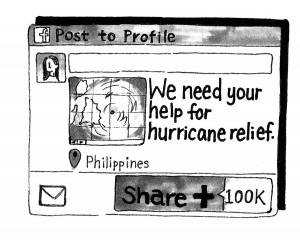Typhoon relief depends on global society
With winds 3.5 times as strong as Hurricane Katrina, Super Typhoon Haiyan hit the Philippines on Nov. 8, ravaging homes and decimating lands. Nearly 11 million Filipinos were affected by this tragedy, according to the Economist.
Many organizations, such as World Vision, have harnessed the power of social media to spread awareness of the tragedy and encourage donations to the cause. But real relief does not come in the form of Facebook statuses or tweets — after all, the aid rallied by a few individuals can only go so far. Real relief depends on the actions of the international community.
CNN reported that aid from the United States to the Philippines is at an “unprecedented level.” American aircraft carriers have played a crucial role in assisting displaced people, supplying food and medical care.
But countries such as China are so focused on international politics that they choose to disregard the suffering of thousands. Such actions are simply unacceptable.
China, for example, initially donated a mere $100,000. One hundred thousand dollars is pocket change for the world’s second largest economy. After drawing fire from the international community, China announced it would increase this meager number to $1.64 million.
The New York Times reported that China’s petty donation can be attributed to its sour relationship with the Philippines. In contrast to its offer of a measly $100,000, China pledged $1.5 million to Pakistan during its earthquake in September.
When it comes to humanitarian relief, countries cannot act based solely on their own state’s interests.
Ultimately, people are people and politics must be set aside to end adversity.
Nations such as Taiwan understand this philosophy. According to Time, “In May, a Taiwanese fisherman was killed by the Philippine Coast Guard in the South China Sea.” But Taiwan still sent $200,000 in aid, which is twice the amount of China’s paltry offer.
Starving and homeless families deserve help, regardless of their nationality. The effects of Haiyan necessitate the same multilateral effort seen during the 2004 earthquake that devastated southeast Asia. Even Pakistan, which has had bitter relations with India, offered its help during that time of great distress.
CNN described the sheer havoc that has unfolded in the Philippines best: “The bloated corpses of dogs lie next to body bags filled with human remains. The stench from wreckage hovers all around, as people sift through debris. A line snakes around of the airport, filled with those eager to leave. Families huddle inside the city convention center, savoring their first rice in a week but not knowing when their next meal will come.”
As the Philippines embarks on a long journey to recovery, it desperately needs as many helping hands as it can get. And as effective as social media campaigns can be, it is important to pressure governments to play their part.
Rini Sampath is a sophomore majoring in international relations. She is also the Editorial Director of the Daily Trojan.
Follow Rini on Twitter @RiniSampath

